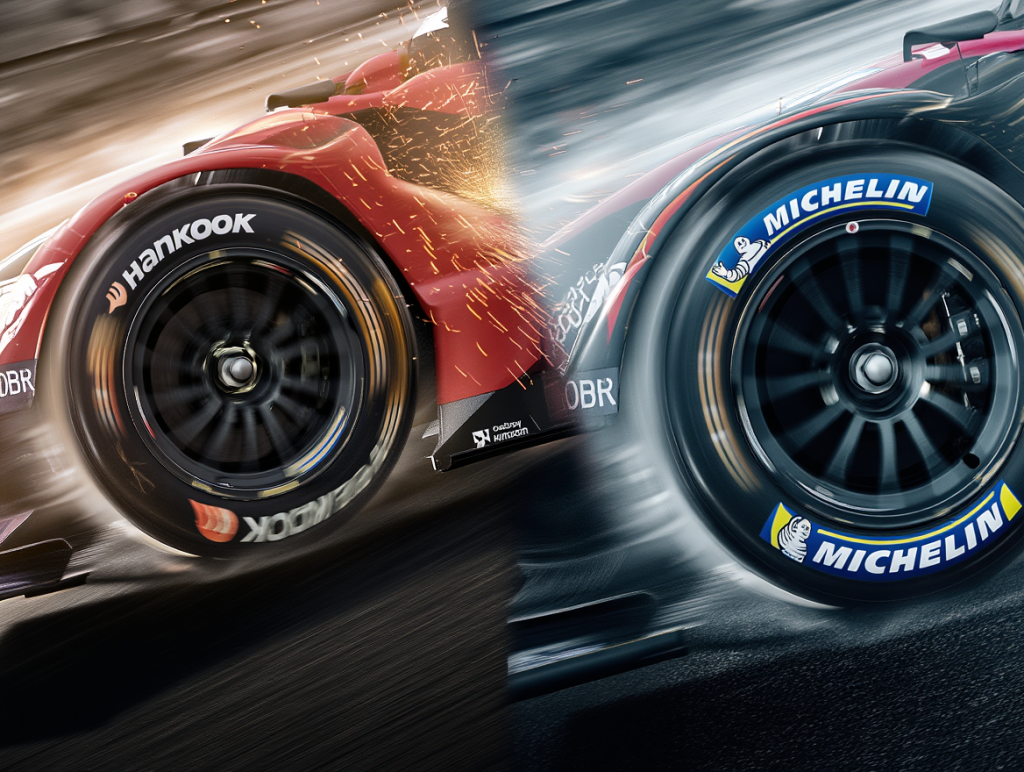Choosing the right tires can make or break your driving experience — from fuel efficiency to road safety. In the battle of Hankook Tires vs Michelin, both brands offer strong performance and reliability, but they target slightly different needs. After analyzing both, I recommend the Michelin Defender2 All-Season Tire for its exceptional tread life, superior comfort, and unbeatable wet traction — a perfect balance of durability and performance.
Why Do I Recommend the Michelin Defender2 All-Season Tire?
When comparing Hankook Kinergy ST (H735) and Michelin Defender2, both impress in quality and technology, but Michelin’s engineering excellence and real-world longevity give it a clear edge. Here’s why the Michelin Defender2 stands out:
- Outstanding Tread Life (Up to 80,000 Miles)
The Michelin Defender2 offers one of the longest tread warranties in the industry, ensuring fewer replacements and long-term savings. Hankook’s Kinergy ST offers good durability but typically lasts around 70,000 miles — slightly less over time.
- Superior Wet and Dry Traction
The Defender2 features Michelin’s EverTread compound and IntelliSipe Technology, providing excellent grip on wet and dry roads. Hankook performs well but doesn’t match the same level of hydroplaning resistance and precision steering in heavy rain.
- Enhanced Comfort and Quiet Ride
Michelin’s advanced tread pitch sequencing minimizes road noise and absorbs vibrations. In contrast, Hankook tires can be slightly louder on rough pavement, especially at higher speeds.
- Fuel Efficiency
Thanks to low rolling resistance, Michelin helps improve fuel economy over time. The design minimizes friction, meaning less fuel consumption — something Hankook’s tires do well, but not as efficiently.
- Improved All-Season Performance
The Defender2 is designed for reliable year-round driving, performing equally well in heat, rain, and light snow. Hankook Kinergy ST offers good all-season traction but struggles slightly in colder, icy conditions.
- Exceptional Stability and Handling
Michelin’s construction provides precise steering response and high-speed stability. The internal structure and sidewall strength ensure predictable handling during cornering or braking — something Hankook performs well at, but Michelin perfects.
- Industry-Leading Brand Trust
Michelin consistently ranks as one of the most reliable tire manufacturers worldwide, backed by decades of innovation and real-world testing.
- Long-Term Value for Money
While Michelin tires may cost more upfront, their longevity and fuel savings often offset the higher price — making them a smarter long-term investment.
Side-by-Side Comparison Chart: Hankook Tires vs Michelin
|
Features |
Hankook Kinergy ST (H735) |
Michelin Defender2 All-Season Tire |
| Brand Origin | South Korea | France |
| Tread Life Warranty | 70,000 miles | 80,000 miles |
| Tread Compound | High-grip silica compound | EverTread next-gen rubber compound |
| Traction Type | All-season | All-season |
| Snow Rating | Standard M+S | M+S, optimized for light snow |
| Wet Traction Performance | Good | Excellent (IntelliSipe Technology) |
| Comfort & Noise Level | Moderate comfort, some road noise | Exceptional comfort, very quiet |
| Fuel Efficiency | Moderate | High (Low rolling resistance) |
| Ride Stability | Stable for urban/highway | Enhanced stability even at high speeds |
| Handling Precision | Responsive but slightly soft in corners | Very precise steering and corner control |
| Price Range | Budget-friendly | Premium |
| Warranty | Limited tread life warranty | 80,000-mile manufacturer warranty |
| Best For | Everyday commuters on a budget | Drivers who want longevity and premium performance |
| Amazon Product Link | Hankook Kinergy ST (H735) | Michelin Defender2 All-Season Tire |
What Common Hankook Tires vs Michelin Tires Can Do?
Both Hankook Kinergy ST and Michelin Defender2 share several traits that make them top choices among all-season tires. Both brands excel in delivering reliable traction, improved comfort, and consistent all-weather handling.
All-Season Traction:
Both Hankook and Michelin are engineered for reliable performance year-round. Their tread designs offer excellent grip on dry, wet, and mildly snowy surfaces, ensuring stability across changing weather conditions.
Quiet and Comfortable Rides:
Both tires incorporate advanced noise-reduction patterns for smooth driving. While Michelin edges out slightly, Hankook still delivers impressive quietness for its price point, offering a comfortable highway ride.
Fuel Efficiency:
Both use low rolling resistance compounds that help reduce fuel consumption, translating to cost savings over time. Michelin’s efficiency is slightly higher, but Hankook remains competitive in its price category.
Safety and Braking Performance:
Both tires prioritize safety through advanced tread block geometry. They maintain solid contact with the road surface for shorter braking distances and stable handling in emergencies.
Durability and Construction:
Hankook and Michelin use reinforced belts and durable rubber compounds for longevity and protection against punctures. Both are suitable for everyday commuting and long-distance driving.
Common Features of Hankook Tires vs Michelin Tires
|
Features |
Hankook Kinergy ST (H735) | |
| All-Season Design | Yes | Yes |
| Tread Pattern Type | Symmetric | Symmetric |
| Silica Compound | Yes | Yes |
| Noise Reduction Technology | Yes | Yes |
| Wet Grip Channels | Yes | Yes |
| Durability-Focused Design | Yes | Yes |
| Eco-Friendly Manufacturing | Yes | Yes |
| Warranty Coverage | Yes | Yes |
Perfect! Here’s Part 2 of your article: Detailed Comparison, Conclusion, and FAQs for “Hankook Tires vs Michelin Tires – Which Is Better?”
A Detailed Comparison of Hankook Tires vs Michelin Tires
Here’s a feature-by-feature breakdown of Hankook Kinergy ST (H735) and Michelin Defender2 All-Season Tires, showing how each performs in key areas.

1. Tread Design and Performance
The Hankook Kinergy ST (H735) features a symmetric tread design with four wide circumferential grooves that efficiently evacuate water, reducing hydroplaning risk. Its silica-enhanced compound provides reliable grip in both dry and wet conditions, making it ideal for city streets and highways.
The Michelin Defender2, in comparison, uses a more advanced IntelliSipe™ technology and optimized tread design that maintains traction as the tire wears. It performs excellently in rain, light snow, and dry pavement while offering smoother handling. For drivers prioritizing long-term grip and a stable ride, Michelin leads in highway and wet conditions, while Hankook is strong for urban and moderate all-season use.
2. Comfort and Noise Reduction
Hankook tires incorporate a quiet rib design, which minimizes road noise for city commuting. The ride is comfortable, but on rougher roads or higher speeds, slight vibrations can be noticed.
Michelin Defender2’s Comfort Control™ Technology goes a step further. It minimizes vibrations and reduces noise more effectively, providing a smoother, more serene driving experience. For long-distance drivers and families, Michelin’s comfort advantage is significant.
3. Wet and Dry Traction
The Hankook Kinergy ST performs well in both wet and dry conditions due to its multi-angled tread blocks, which improve braking response and cornering control. Water is efficiently dispersed, reducing hydroplaning risk.
Michelin Defender2, however, maintains superior traction thanks to its full-depth sipes and EverTread™ compound. The tires grip roads firmly even in heavy rain, providing predictable handling. While Hankook performs admirably, Michelin gives slightly better braking distances and safer wet-road confidence.
4. Snow and Ice Performance
Hankook tires are all-season rated but don’t carry a winter or 3PMSF certification. They perform decently in light snow but may struggle in icy or deeper snow conditions.
Michelin Defender2 is designed for moderate winter conditions, performing better on snow-covered roads thanks to its optimized siping. For drivers in areas with occasional snow or ice, Michelin provides safer traction.
5. Durability and Tread Life
The Hankook Kinergy ST uses a high-strength silica compound that offers up to 70,000 miles of tread life. It balances durability with affordability, making it ideal for everyday commuters.
Michelin Defender2, however, uses the EverTread™ compound, providing up to 80,000 miles of wear. Combined with even tread distribution, this makes it a long-lasting tire for drivers looking to avoid frequent replacements.
6. Handling and Stability
Hankook tires are responsive in urban driving and highway conditions, but aggressive cornering may feel slightly less controlled due to softer sidewalls.
Michelin Defender2 has reinforced sidewalls and optimized contact patches for improved stability and handling. Steering feels precise, and high-speed cornering remains controlled and predictable.
7. Fuel Efficiency
Both tires reduce rolling resistance, but Michelin’s low rolling resistance design is slightly more effective. Drivers can save on fuel over the tire’s lifespan, especially for highway commuting. Hankook remains efficient but ranks just below Michelin in fuel economy benefits.
Conclusion
Both Hankook Kinergy ST (H735) and Michelin Defender2 are excellent tires, but your choice should depend on priorities:
- Choose Hankook Kinergy ST if you want budget-friendly, reliable all-season tires that handle city and moderate highway driving with good durability.
- Choose Michelin Defender2 if you want premium comfort, long tread life, superior wet traction, and stable handling — perfect for highway commuting, family vehicles, and long-term savings.
For most drivers seeking long-term reliability, comfort, and all-weather performance, Michelin Defender2 is the recommended choice, while Hankook provides an excellent value option.
FAQs – Hankook Tires vs Michelin
Which tire lasts longer, Hankook or Michelin?
Michelin Defender2 has a longer tread life, up to 80,000 miles, while Hankook Kinergy ST typically lasts around 70,000 miles depending on usage and maintenance.
Are Hankook tires good for light snow?
Yes, Hankook Kinergy ST performs adequately in light snow and wet conditions, but it’s not certified for severe winter conditions.
Which tire is quieter on highways?
Michelin Defender2 is noticeably quieter due to Comfort Control™ technology, minimizing road noise for a smooth ride. Hankook is quieter than many budget tires but slightly noisier than Michelin.
Are Michelin tires more expensive than Hankook?
Yes, Michelin Defender2 is a premium tire and comes at a higher price, but its longevity and performance often offset the cost over time.
Which tire is better for fuel efficiency?
Michelin Defender2 has slightly lower rolling resistance, providing better fuel efficiency on highways compared to Hankook Kinergy ST.
Can Hankook handle long highway commutes?
Yes, Hankook tires are reliable for daily commuting, offering stable traction and comfort, though Michelin provides superior long-distance comfort.
Are both tires all-season?
Yes, both Hankook Kinergy ST and Michelin Defender2 are designed for all-season driving, handling dry, wet, and light snowy conditions.
Which is better for city driving?
Both are suitable, but Hankook is more budget-friendly while still offering solid grip and comfort. Michelin provides premium handling and a smoother, quieter ride.

Benjamin Grey is an automotive engineer and writer at Car Parts Advisor. With years of experience in the automotive industry, he shares expert advice on car parts, maintenance, and repairs to help car owners keep their vehicles running smoothly.





